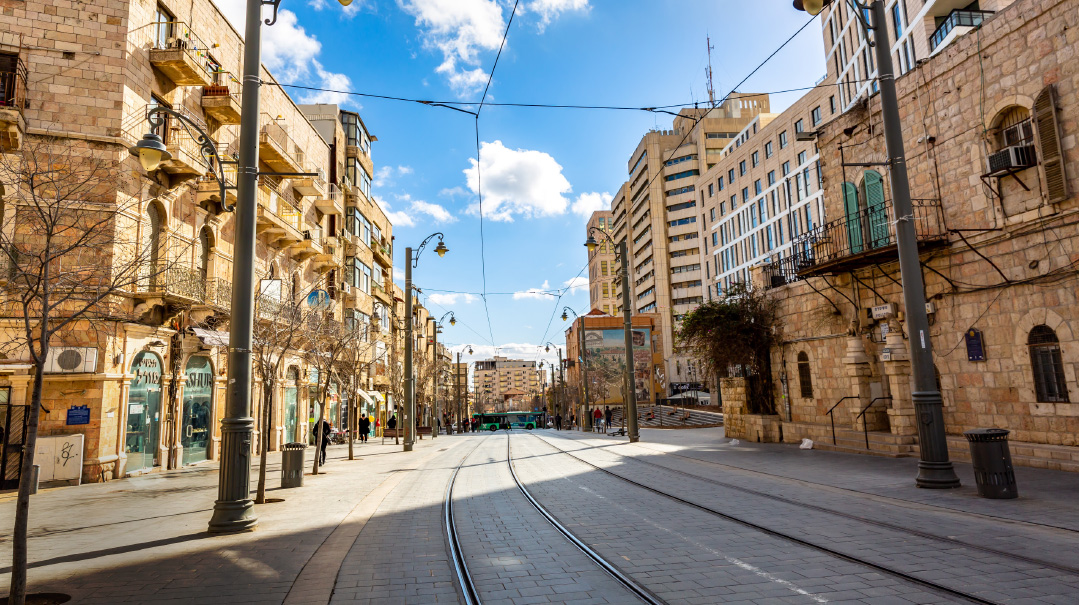Love Letter to Israel

It got me thinking: When does a foreign place feel more comfortable than your birthplace?

Shanah rishonah in Eretz Yisrael, I still mentally converted items to dollars. I remember going to that little makolet on Paran to buy overpriced Gushers and Fruit Roll-Ups, their tangy taste on my tongue a sweet moment when I could close my eyes and pretend that I was in America. I remember the joy I felt opening care packages stuffed with Gap clothes, books, and random things like laptop chargers and stroller attachments and… the list goes on and on. (Does it ever end?)
That first year, I missed buying blueberries every week like I did back home, and still had to use a calculator when the pediatrician asked for my baby’s weight in kilos. And I remember the day Amazon started shipping to Israel. I couldn’t contain my excitement when I saw that box in my living room with Amazon Prime stamped on the side.
But by our third year in Israel, I stopped asking my in-laws to bring things from America when they came to visit, either finding substitutes or making do without. It was getting too exhausting, and besides — you really could get everything in Israel, even if you had to pay a bit more or travel on a bus to get it.
It helped when my friend Ariella shared her philosophy: If we lived in the States, sure, we’d have Target, and Walmart and Amazon 24/7 without having to strategically choose items that met the $49–75 sweet spot. Vanilla extract would be a dollar, and we could return Zappos shoes months later without begging for a refund. But then we’d be living in America — not Israel.
It was a lightbulb moment.
When I finally stopped comparing shekels to dollars, I realized I was getting used to living there — and loving it.
Several years later, on a family visit in the States, I felt more out of place in Los Angeles than I did in Yerushalayim, even though I’d spent two out of three decades in the former. (Had there always been this much grass? I wondered.) It got me thinking: When does a foreign place feel more comfortable than your birthplace? On our return trip, it felt strange coming up that long, beige ramp in Ben Gurion and feeling like I was coming home rather than having left it.
You can adjust to everything, anywhere. I grew to love limonana, shawarma, and silan-and-techinah sandwiches. I loved how my four-year-old spoke fluent Hebrew and rolled the resh — sorry, “ghesh” — and how he sang adorable songs about “Tutim Teumim,” “Pili HaPil,” and the chagim. He could tell me the story of Rivkah and Eliezer in Hebrew, and the projects he brought home — weekly — were first-prize worthy at any Torah fair (shout-out to his morahs: I’ll love you forever). I kept every single one of my son’s projects in a box. I loved that there was school on Sundays, though I initially grumbled about early wake-up and lack of “family time.”
I loved how the silver store owner on Shaulson was also our next-door neighbor, and how he’d come out to greet us each time we passed by his store. Every morning when we’d wait for the elevator, he’d hear us and come say hi. He’d give my son a slice of fresh watermelon, or a small trinket, or a balloon he’d blow up on the spot, and boom: “Hee-lell Akiva! You agh as sveet as vatermel-ohn!”
At first, I couldn’t get over the lack of privacy in apartment-style living — and then I grew used to its advantages. I never ran out of ingredients, or friends, or Shabbos playdates for my kids.
I loved the fruit in Israel, and even appreciated how they’d change with the seasons, a tangible reminder of Hashem’s Hand in the harvest. Pomegranates in Tishrei, persimmons and juicy citrus in the winter. I’d lug a watermelon home every week in the summer, placing it in the basket of my Vista and hoping it wouldn’t roll out when I boarded the bus.
And then we left.
After considerable thought and consultation with rabbanim, my husband accepted a job in the small Midwest town we now live in.
Our lift was huge. I sent back everything, including my Dr. Fischer’s creams, puzzles, and the ten-kilo box containing a year’s worth of gan projects.
When we first arrived, I thought, Where is the silan? Why are persimmons so expensive? And why do shoppers stand so far away from each other, as if there’s an invisible bubble they cannot pass? I firmly decided that American Sundays are a waste of a day (how do mothers manage being home with their kids all day Shabbos and Sunday?) and wondered why Ivrit wasn’t being taught in early childhood (don’t kids need it to learn Chumash and Mishnayos?)
That’s the thing about getting used to things — you first wonder how you’ll ever adjust to the new circumstances, and then you wonder how you ever managed beforehand.
Now, when trying to calculate the cost of clementines at Aldi’s, I convert the price to shekels in my head. I miss the Israeli fruits, miss my son’s gan, miss my 18-year-old mother’s helper from the Russian ulpanah. (I realized I can’t live without Chani. I seriously asked if she’d come with us to America.)
I miss the stores: how the Yesh cashiers would pinch my kids’ cheeks, give me brachos, and make tsk-tsk sounds at my sockless baby. I’d become used to tight spaces, elbows bumping into me, and people pushing their shopping carts like a bumper-cart ride at an amusement park. The empty space and wide aisles at American stores feel unnerving.
On a recent visit to Los Angeles, I found a specialty Israeli grocery selling Schweppes and those light-blue Maya-brand vanilla sugar packets. There were also those yummy corn schnitzels. (Am I the only one who can’t eat fewer than three in one sitting?) I couldn’t contain my delight.
At “Tel Aviv,” a new kosher restaurant in the Valley, I ordered shakshuka, a platter of assorted dips with pita, and of course, slushy iced coffee; for a second, I imagined I was back on Israeli soil.
Here, I search for a sponja stick in vain. I hate our Swiffer and Bona; nothing mops well no matter how hard I scrub. Oh, and the standard American trash cans are way too small. I should have brought our garbage can and sponja stick on our lift, I think more than once.
Now, whenever I detect Israeli-accented English (a rare occurrence in this tiny town), I jump. Are you from Israel? We just moved from there! The Israelis’ faces light up and they switch to Hebrew. On one of these occasions, I met Irit, a lovely woman who also recently moved from Israel to the States with her family. I was thrilled when she agreed to have my son visit her house so he could continue hearing conversational Hebrew, which, according to my research, is the only way kids can retain a second language. Twice a week I drive 30 minutes away just so he (and I) can listen to her talk.
Life works in funny ways. We always want what we don’t have.
Now, I buy Osem and Maya and Tnuvah products — the Hebrew packaging brings me an odd sense of comfort, of home. My pantry is filled with Israeli spices and Bamba. At Trader Joe’s, of all places, I find the famous Gad Bulgarian feta cheese with Rav Rubin’s hechsher, and buy three containers.
Now, instead of Llama Llama and Curious George, I ask people going to Israel to bring me back Hebrew kids’ books. We read Chalomo shel Uri and Savta Bishla Daisa as bedtime stories. I try my best to ask my son questions in Hebrew and have him respond in kind.
Still, you can’t hold on to everything, no matter how hard you try. Spices finish, creams run out, and there’s only so many times you can ask people traveling to Israel to bring you back the things you miss. My son’s Hebrew is slowly diminishing, day by day, and he doesn’t say “rakevet” now the way he used to.
Even memories fade over time, which is why it was so important to me to write this now.
My heart constricted when, several weeks ago, my son forgot what Igloos were. “Remember those tube popsicles? You had them every day in the summer! You loved them!”
His face was blank. No recollection.
I couldn’t stop my tears.
(Originally featured in Family First, Issue 836)
Oops! We could not locate your form.







